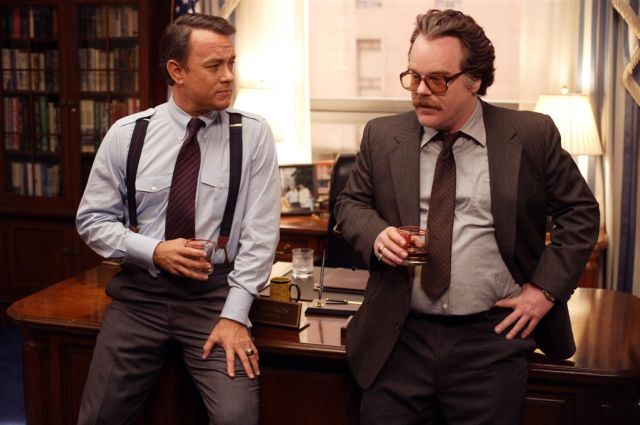

Based on a true story, Charlie Wilson's War is hard to believe. Or, cynically, maybe it's too easy to believe that government is bloated enough to not know what is going on. Directed by Mike Nichols (winner of the 1967 Oscar for The Graduate), as a comedy it has some funny lines, but as a political statement it has a dormant effect that causes later reflection.
Tom Hanks stars as Charlie Wilson, US Congressman from Texas, who at first seems to be an unprincipled womanizing drinker. When he is naked in a Vegas hot-tub with several hotties and a TV producer, he notices a bearded and turbaned Dan Rather on the TV news. This is his initial exposure to Afghanistan. On the defense appropriations committee, he decides to double the CIA Afghan budget to $10M. But this is mere chicken feed.
Later, Joanne Herring (Julia Roberts), a rich right-wing Texan with an interest in freeing the Aghans from the Soviet oppression, schedules Wilson to meet President Zia of Pakistan. In this meeting, Wilson gets a dressing down
 from Zia and his generals for the lack of support by the CIA. Taking it in stride, he is ready to leave with political platitudes preached, when Zia makes him promise to visit a refugee camp that very day. Flying there in a waiting helicoptor, Wilson tells lapdog aid Bonnie Bach (Amy Adams), "You know you've reached rock bottom when you're told you have character flaws by a man who hanged his predecessor in a military coup."
from Zia and his generals for the lack of support by the CIA. Taking it in stride, he is ready to leave with political platitudes preached, when Zia makes him promise to visit a refugee camp that very day. Flying there in a waiting helicoptor, Wilson tells lapdog aid Bonnie Bach (Amy Adams), "You know you've reached rock bottom when you're told you have character flaws by a man who hanged his predecessor in a military coup." But this trip proves life-changing for Wilson. He sees widows fighting for a few grains of rice, children without arms and legs due to booby-trapped candies and toys, and tents housing families as far as the eye could see. Seeing first-hand the results of bombs, mines and war, he returns prepared to make a difference.
But this trip proves life-changing for Wilson. He sees widows fighting for a few grains of rice, children without arms and legs due to booby-trapped candies and toys, and tents housing families as far as the eye could see. Seeing first-hand the results of bombs, mines and war, he returns prepared to make a difference. With the help of CIA agent Gust Avrakotos (Philip Seymour Hoffman), an undiplomatic forthright agent who gets things done, Wilson, Avrakotos and Herring prove an unlikely trio who changed things forever while the world slept. Slowly, Wilson raises the budget to $40M and then $500M and then over a billion. Sending modern weapons to combat the Russian Hind helicopter gunships, Wilson gets an education and a victory in this covert war, a war that the US never wanted, but a war that they won . . . and lost.
With the help of CIA agent Gust Avrakotos (Philip Seymour Hoffman), an undiplomatic forthright agent who gets things done, Wilson, Avrakotos and Herring prove an unlikely trio who changed things forever while the world slept. Slowly, Wilson raises the budget to $40M and then $500M and then over a billion. Sending modern weapons to combat the Russian Hind helicopter gunships, Wilson gets an education and a victory in this covert war, a war that the US never wanted, but a war that they won . . . and lost.As the closing credits said, "These things happened. They were glorious and they changed the world... and then we [screwed] up the endgame." Like many political issues, once an issue appears over, it is over in the eyes of the politicians. And then it is old news in the media and the populace forgets. Like the morning mist it dissipates and is forgotten. Without bringing an issue, or a war, to closure the loose ends can cause us to trip and fall flat on our faces.
In Afghanistan, the US armed the local mujahideen to fight the enemy, the soviets. And they won. But without providing them education and hospitals, ongoing support, we left the fatherless children with an inaccurate portrait of America. Now, years later, those same mujahideen are the Taliban "freedom fighters" that support Al Qaeda and follow Osama Bin Laden. Like Frankenstein, we sometimes create our own monsters.
Along with this political lesson, Charlie Wilson's War illustrates an adage well-known by charities and missionary agencies. When Charlie Wilson hears about Afghanistan he quickly doubles the CIA budget. But with little thought, it's done and gone, over and out (of mind). Only when he sees first-hand the effects does he emotionally understand the issue. And with emotional buy-in, he becomes invested, changed. When charities ask for money, people sometimes give. But when charities ask for first-hand involvement, showing the effects and the impact of personal giving, people invest. Giving is often one-time, from afar; investing is often ongoing, from actual experience. Such emotional involvement changes us and changes our plans!
Copyright 2008, Martin Baggs

No comments:
Post a Comment